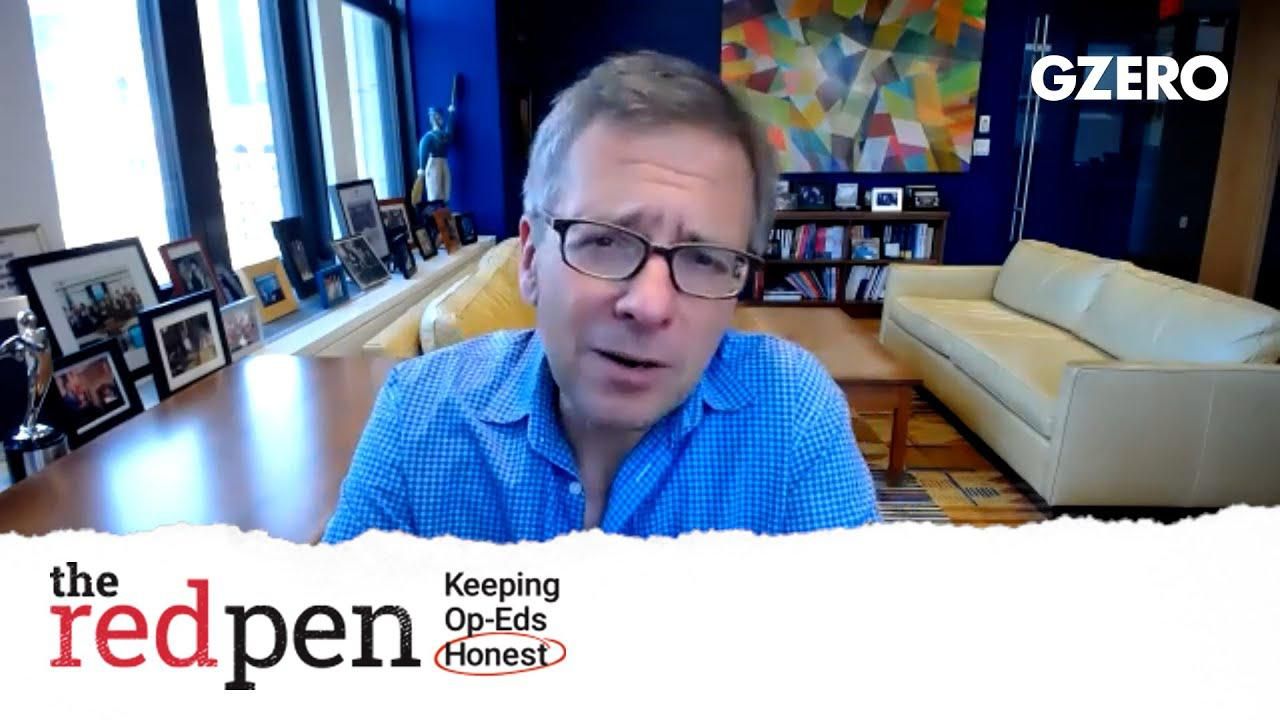The Red Pen
Multinational corporations aren't about to give up on global business

Multinational Corporations Aren’t About To Give Up on Global Business | The Red Pen | GZERO Media

An op-ed in the Financial Times argues that the era of borderless enterprise may be past, thanks to rising geopolitical tensions between the US and China. In "Geopolitics spells the demise of the global chief executive," Elisabeth Braw writes that the nationalities of companies and their chief executives now matter again and their ability to pursue a truly global business strategy will be limited. But has the situation actually changed? Ian Bremmer and Eurasia Group analyst Charles Dunst take out the Red Pen to explain that nationalities have always mattered, and many of these risks aren't new.
Today we are talking about the impact that increasing geopolitical tensions could have on big, multinational corporations. In a recent op-ed for the Financial Times, Elisabeth Braw of the American Enterprise Institute, AEI, argues that we could be entering a distinctly new chapter in global business, one in which where a company comes from matters much more. In other words, a move away from borderless companies and toward nationalism.
She cites CEOs like Ramon Laguarta of Pepsi and Satya Nadella of Microsoft, both foreign-born executives leading American companies, as a positive trend of globalization that may come to an end in the current political reality.
It's an extremely interesting and provocative piece. You should definitely read it.
We are not convinced. Let's get out the Red Pen.
First, Braw writes that "the era of borderless enterprise may be past" and argues that "suddenly companies', and executives', nationalities matter again."
[rebelmouse-image 26418959 is_animated_gif="false" crop_info="%7B%22image%22%3A%20%22https%3A//assets.rbl.ms/26418959/origin.png%22%2C%20%22thumbnails%22%3A%20%7B%22origin%22%3A%20%22https%3A//assets.rbl.ms/26418959/origin.png%22%2C%20%222000x1500%22%3A%20%22https%3A//www.gzeromedia.com/media-library/eyJhbGciOiJIUzI1NiIsInR5cCI6IkpXVCJ9.eyJpbWFnZSI6Imh0dHBzOi8vYXNzZXRzLnJibC5tcy8yNjQxODk1OS9vcmlnaW4ucG5nIiwiZXhwaXJlc19hdCI6MTYzOTI3MzAyNH0.ekkJk4dOa7Vyiny8e-jlSz_pAkiJSnSMSm7rGKWBGZM/image.png%3Fwidth%3D2000%26coordinates%3D180%252C0%252C180%252C0%26height%3D1500%22%2C%20%22600x200%22%3A%20%22https%3A//www.gzeromedia.com/media-library/eyJhbGciOiJIUzI1NiIsInR5cCI6IkpXVCJ9.eyJpbWFnZSI6Imh0dHBzOi8vYXNzZXRzLnJibC5tcy8yNjQxODk1OS9vcmlnaW4ucG5nIiwiZXhwaXJlc19hdCI6MTYzOTI3MzAyNH0.ekkJk4dOa7Vyiny8e-jlSz_pAkiJSnSMSm7rGKWBGZM/image.png%3Fwidth%3D600%26coordinates%3D0%252C115%252C0%252C115%26height%3D200%22%2C%20%2235x35%22%3A%20%22https%3A//www.gzeromedia.com/media-library/eyJhbGciOiJIUzI1NiIsInR5cCI6IkpXVCJ9.eyJpbWFnZSI6Imh0dHBzOi8vYXNzZXRzLnJibC5tcy8yNjQxODk1OS9vcmlnaW4ucG5nIiwiZXhwaXJlc19hdCI6MTYzOTI3MzAyNH0.ekkJk4dOa7Vyiny8e-jlSz_pAkiJSnSMSm7rGKWBGZM/image.png%3Fwidth%3D35%26height%3D35%22%2C%20%22600x600%22%3A%20%22https%3A//www.gzeromedia.com/media-library/eyJhbGciOiJIUzI1NiIsInR5cCI6IkpXVCJ9.eyJpbWFnZSI6Imh0dHBzOi8vYXNzZXRzLnJibC5tcy8yNjQxODk1OS9vcmlnaW4ucG5nIiwiZXhwaXJlc19hdCI6MTYzOTI3MzAyNH0.ekkJk4dOa7Vyiny8e-jlSz_pAkiJSnSMSm7rGKWBGZM/image.png%3Fwidth%3D600%26coordinates%3D285%252C0%252C285%252C0%26height%3D600%22%2C%20%22980x%22%3A%20%22https%3A//www.gzeromedia.com/media-library/eyJhbGciOiJIUzI1NiIsInR5cCI6IkpXVCJ9.eyJpbWFnZSI6Imh0dHBzOi8vYXNzZXRzLnJibC5tcy8yNjQxODk1OS9vcmlnaW4ucG5nIiwiZXhwaXJlc19hdCI6MTYzOTI3MzAyNH0.ekkJk4dOa7Vyiny8e-jlSz_pAkiJSnSMSm7rGKWBGZM/image.png%3Fwidth%3D980%22%2C%20%22700x1245%22%3A%20%22https%3A//www.gzeromedia.com/media-library/eyJhbGciOiJIUzI1NiIsInR5cCI6IkpXVCJ9.eyJpbWFnZSI6Imh0dHBzOi8vYXNzZXRzLnJibC5tcy8yNjQxODk1OS9vcmlnaW4ucG5nIiwiZXhwaXJlc19hdCI6MTYzOTI3MzAyNH0.ekkJk4dOa7Vyiny8e-jlSz_pAkiJSnSMSm7rGKWBGZM/image.png%3Fwidth%3D700%26coordinates%3D422%252C0%252C423%252C0%26height%3D1245%22%2C%20%221000x750%22%3A%20%22https%3A//www.gzeromedia.com/media-library/eyJhbGciOiJIUzI1NiIsInR5cCI6IkpXVCJ9.eyJpbWFnZSI6Imh0dHBzOi8vYXNzZXRzLnJibC5tcy8yNjQxODk1OS9vcmlnaW4ucG5nIiwiZXhwaXJlc19hdCI6MTYzOTI3MzAyNH0.ekkJk4dOa7Vyiny8e-jlSz_pAkiJSnSMSm7rGKWBGZM/image.png%3Fwidth%3D1000%26coordinates%3D180%252C0%252C180%252C0%26height%3D750%22%2C%20%221500x2000%22%3A%20%22https%3A//www.gzeromedia.com/media-library/eyJhbGciOiJIUzI1NiIsInR5cCI6IkpXVCJ9.eyJpbWFnZSI6Imh0dHBzOi8vYXNzZXRzLnJibC5tcy8yNjQxODk1OS9vcmlnaW4ucG5nIiwiZXhwaXJlc19hdCI6MTYzOTI3MzAyNH0.ekkJk4dOa7Vyiny8e-jlSz_pAkiJSnSMSm7rGKWBGZM/image.png%3Fwidth%3D1500%26coordinates%3D363%252C0%252C364%252C0%26height%3D2000%22%2C%20%22600x%22%3A%20%22https%3A//www.gzeromedia.com/media-library/eyJhbGciOiJIUzI1NiIsInR5cCI6IkpXVCJ9.eyJpbWFnZSI6Imh0dHBzOi8vYXNzZXRzLnJibC5tcy8yNjQxODk1OS9vcmlnaW4ucG5nIiwiZXhwaXJlc19hdCI6MTYzOTI3MzAyNH0.ekkJk4dOa7Vyiny8e-jlSz_pAkiJSnSMSm7rGKWBGZM/image.png%3Fwidth%3D600%22%2C%20%221200x400%22%3A%20%22https%3A//www.gzeromedia.com/media-library/eyJhbGciOiJIUzI1NiIsInR5cCI6IkpXVCJ9.eyJpbWFnZSI6Imh0dHBzOi8vYXNzZXRzLnJibC5tcy8yNjQxODk1OS9vcmlnaW4ucG5nIiwiZXhwaXJlc19hdCI6MTYzOTI3MzAyNH0.ekkJk4dOa7Vyiny8e-jlSz_pAkiJSnSMSm7rGKWBGZM/image.png%3Fwidth%3D1200%26coordinates%3D0%252C115%252C0%252C115%26height%3D400%22%2C%20%22600x400%22%3A%20%22https%3A//www.gzeromedia.com/media-library/eyJhbGciOiJIUzI1NiIsInR5cCI6IkpXVCJ9.eyJpbWFnZSI6Imh0dHBzOi8vYXNzZXRzLnJibC5tcy8yNjQxODk1OS9vcmlnaW4ucG5nIiwiZXhwaXJlc19hdCI6MTYzOTI3MzAyNH0.ekkJk4dOa7Vyiny8e-jlSz_pAkiJSnSMSm7rGKWBGZM/image.png%3Fwidth%3D600%26coordinates%3D127%252C0%252C128%252C0%26height%3D400%22%2C%20%221200x800%22%3A%20%22https%3A//www.gzeromedia.com/media-library/eyJhbGciOiJIUzI1NiIsInR5cCI6IkpXVCJ9.eyJpbWFnZSI6Imh0dHBzOi8vYXNzZXRzLnJibC5tcy8yNjQxODk1OS9vcmlnaW4ucG5nIiwiZXhwaXJlc19hdCI6MTYzOTI3MzAyNH0.ekkJk4dOa7Vyiny8e-jlSz_pAkiJSnSMSm7rGKWBGZM/image.png%3Fwidth%3D1200%26coordinates%3D127%252C0%252C128%252C0%26height%3D800%22%2C%20%22600x300%22%3A%20%22https%3A//www.gzeromedia.com/media-library/eyJhbGciOiJIUzI1NiIsInR5cCI6IkpXVCJ9.eyJpbWFnZSI6Imh0dHBzOi8vYXNzZXRzLnJibC5tcy8yNjQxODk1OS9vcmlnaW4ucG5nIiwiZXhwaXJlc19hdCI6MTYzOTI3MzAyNH0.ekkJk4dOa7Vyiny8e-jlSz_pAkiJSnSMSm7rGKWBGZM/image.png%3Fwidth%3D600%26coordinates%3D0%252C15%252C0%252C15%26height%3D300%22%2C%20%22210x%22%3A%20%22https%3A//www.gzeromedia.com/media-library/eyJhbGciOiJIUzI1NiIsInR5cCI6IkpXVCJ9.eyJpbWFnZSI6Imh0dHBzOi8vYXNzZXRzLnJibC5tcy8yNjQxODk1OS9vcmlnaW4ucG5nIiwiZXhwaXJlc19hdCI6MTYzOTI3MzAyNH0.ekkJk4dOa7Vyiny8e-jlSz_pAkiJSnSMSm7rGKWBGZM/image.png%3Fwidth%3D210%22%2C%20%22300x300%22%3A%20%22https%3A//www.gzeromedia.com/media-library/eyJhbGciOiJIUzI1NiIsInR5cCI6IkpXVCJ9.eyJpbWFnZSI6Imh0dHBzOi8vYXNzZXRzLnJibC5tcy8yNjQxODk1OS9vcmlnaW4ucG5nIiwiZXhwaXJlc19hdCI6MTYzOTI3MzAyNH0.ekkJk4dOa7Vyiny8e-jlSz_pAkiJSnSMSm7rGKWBGZM/image.png%3Fwidth%3D300%26coordinates%3D285%252C0%252C285%252C0%26height%3D300%22%2C%20%221245x700%22%3A%20%22https%3A//www.gzeromedia.com/media-library/eyJhbGciOiJIUzI1NiIsInR5cCI6IkpXVCJ9.eyJpbWFnZSI6Imh0dHBzOi8vYXNzZXRzLnJibC5tcy8yNjQxODk1OS9vcmlnaW4ucG5nIiwiZXhwaXJlc19hdCI6MTYzOTI3MzAyNH0.ekkJk4dOa7Vyiny8e-jlSz_pAkiJSnSMSm7rGKWBGZM/image.png%3Fwidth%3D1245%26coordinates%3D40%252C0%252C40%252C0%26height%3D700%22%2C%20%22750x1000%22%3A%20%22https%3A//www.gzeromedia.com/media-library/eyJhbGciOiJIUzI1NiIsInR5cCI6IkpXVCJ9.eyJpbWFnZSI6Imh0dHBzOi8vYXNzZXRzLnJibC5tcy8yNjQxODk1OS9vcmlnaW4ucG5nIiwiZXhwaXJlc19hdCI6MTYzOTI3MzAyNH0.ekkJk4dOa7Vyiny8e-jlSz_pAkiJSnSMSm7rGKWBGZM/image.png%3Fwidth%3D750%26coordinates%3D363%252C0%252C364%252C0%26height%3D1000%22%2C%20%22300x%22%3A%20%22https%3A//www.gzeromedia.com/media-library/eyJhbGciOiJIUzI1NiIsInR5cCI6IkpXVCJ9.eyJpbWFnZSI6Imh0dHBzOi8vYXNzZXRzLnJibC5tcy8yNjQxODk1OS9vcmlnaW4ucG5nIiwiZXhwaXJlc19hdCI6MTYzOTI3MzAyNH0.ekkJk4dOa7Vyiny8e-jlSz_pAkiJSnSMSm7rGKWBGZM/image.png%3Fwidth%3D300%22%2C%20%221200x600%22%3A%20%22https%3A//www.gzeromedia.com/media-library/eyJhbGciOiJIUzI1NiIsInR5cCI6IkpXVCJ9.eyJpbWFnZSI6Imh0dHBzOi8vYXNzZXRzLnJibC5tcy8yNjQxODk1OS9vcmlnaW4ucG5nIiwiZXhwaXJlc19hdCI6MTYzOTI3MzAyNH0.ekkJk4dOa7Vyiny8e-jlSz_pAkiJSnSMSm7rGKWBGZM/image.png%3Fwidth%3D1200%26coordinates%3D0%252C15%252C0%252C15%26height%3D600%22%7D%2C%20%22manual_image_crops%22%3A%20%7B%223x1%22%3A%20%7B%22width%22%3A%201200%2C%20%22top%22%3A%20115%2C%20%22height%22%3A%20400%2C%20%22left%22%3A%200%2C%20%22sizes%22%3A%20%5B%221200x400%22%2C%20%22600x200%22%5D%7D%2C%20%223x2%22%3A%20%7B%22width%22%3A%20945%2C%20%22top%22%3A%200%2C%20%22height%22%3A%20630%2C%20%22left%22%3A%20127%2C%20%22sizes%22%3A%20%5B%221200x800%22%2C%20%22600x400%22%5D%7D%2C%20%221x1%22%3A%20%7B%22width%22%3A%20630%2C%20%22top%22%3A%200%2C%20%22height%22%3A%20630%2C%20%22left%22%3A%20285%2C%20%22sizes%22%3A%20%5B%22600x600%22%2C%20%22300x300%22%5D%7D%2C%20%223x4%22%3A%20%7B%22width%22%3A%20473%2C%20%22top%22%3A%200%2C%20%22height%22%3A%20630%2C%20%22left%22%3A%20363%2C%20%22sizes%22%3A%20%5B%221500x2000%22%2C%20%22750x1000%22%5D%7D%2C%20%2216x9%22%3A%20%7B%22width%22%3A%201120%2C%20%22top%22%3A%200%2C%20%22height%22%3A%20630%2C%20%22left%22%3A%2040%2C%20%22sizes%22%3A%20%5B%221245x700%22%5D%7D%2C%20%229x16%22%3A%20%7B%22width%22%3A%20355%2C%20%22top%22%3A%200%2C%20%22height%22%3A%20630%2C%20%22left%22%3A%20422%2C%20%22sizes%22%3A%20%5B%22700x1245%22%5D%7D%2C%20%224x3%22%3A%20%7B%22width%22%3A%20840%2C%20%22top%22%3A%200%2C%20%22height%22%3A%20630%2C%20%22left%22%3A%20180%2C%20%22sizes%22%3A%20%5B%222000x1500%22%2C%20%221000x750%22%5D%7D%2C%20%22600x300%22%3A%20%7B%22width%22%3A%201200%2C%20%22top%22%3A%2015%2C%20%22height%22%3A%20600%2C%20%22left%22%3A%200%2C%20%22sizes%22%3A%20%5B%22600x300%22%5D%7D%2C%20%222x1%22%3A%20%7B%22width%22%3A%201200%2C%20%22top%22%3A%2015%2C%20%22height%22%3A%20600%2C%20%22left%22%3A%200%2C%20%22sizes%22%3A%20%5B%221200x600%22%2C%20%22600x300%22%5D%7D%7D%7D" dam="0" site_id=19128044 pin_description="" original_size="1200x630" alt=""The era of borderless enterprise may be past...suddenly companies', and executives', nationalities matter again." When did nationalities stop mattering?" expand="1"]
So question, when did nationalities stop mattering? Governments have long supported their national champions. In the wake of the 2008-09 financial crisis, the German government spent 1.5 billion euros to bail out their auto industry. BMW, for one, might have had non-German higher ups, but when the rubber met the road, it mattered the most was that BMW was a German company. The era of the globalization never meant an end to national pride or responsibility when things got tough.
Secondly, the number of foreign CEOs of Global Fortune 500 companies has remained pretty constant since the 2008 financial crisis. I'd also point out that as of 2019, the last date we could find good numbers for, 45% of the companies on that list were founded by immigrants or the children of immigrants. No real change.
Next, Braw suggests that Western corporate titans may now conclude that the companies they run "should be loyal not just to their shareholders but to the company's home country if it provides democracy, rule of law and a safe business environment."
[rebelmouse-image 26418965 is_animated_gif="false" crop_info="%7B%22image%22%3A%20%22https%3A//assets.rbl.ms/26418965/origin.png%22%2C%20%22thumbnails%22%3A%20%7B%22origin%22%3A%20%22https%3A//assets.rbl.ms/26418965/origin.png%22%2C%20%222000x1500%22%3A%20%22https%3A//www.gzeromedia.com/media-library/eyJhbGciOiJIUzI1NiIsInR5cCI6IkpXVCJ9.eyJpbWFnZSI6Imh0dHBzOi8vYXNzZXRzLnJibC5tcy8yNjQxODk2NS9vcmlnaW4ucG5nIiwiZXhwaXJlc19hdCI6MTY1NDU2ODIwN30.InYwTvE_MiCHwmM1Crw2zkD6ARVu-Z2tdEPJWJ322zE/image.png%3Fwidth%3D2000%26coordinates%3D180%252C0%252C180%252C0%26height%3D1500%22%2C%20%22600x200%22%3A%20%22https%3A//www.gzeromedia.com/media-library/eyJhbGciOiJIUzI1NiIsInR5cCI6IkpXVCJ9.eyJpbWFnZSI6Imh0dHBzOi8vYXNzZXRzLnJibC5tcy8yNjQxODk2NS9vcmlnaW4ucG5nIiwiZXhwaXJlc19hdCI6MTY1NDU2ODIwN30.InYwTvE_MiCHwmM1Crw2zkD6ARVu-Z2tdEPJWJ322zE/image.png%3Fwidth%3D600%26coordinates%3D0%252C115%252C0%252C115%26height%3D200%22%2C%20%2235x35%22%3A%20%22https%3A//www.gzeromedia.com/media-library/eyJhbGciOiJIUzI1NiIsInR5cCI6IkpXVCJ9.eyJpbWFnZSI6Imh0dHBzOi8vYXNzZXRzLnJibC5tcy8yNjQxODk2NS9vcmlnaW4ucG5nIiwiZXhwaXJlc19hdCI6MTY1NDU2ODIwN30.InYwTvE_MiCHwmM1Crw2zkD6ARVu-Z2tdEPJWJ322zE/image.png%3Fwidth%3D35%26height%3D35%22%2C%20%22600x600%22%3A%20%22https%3A//www.gzeromedia.com/media-library/eyJhbGciOiJIUzI1NiIsInR5cCI6IkpXVCJ9.eyJpbWFnZSI6Imh0dHBzOi8vYXNzZXRzLnJibC5tcy8yNjQxODk2NS9vcmlnaW4ucG5nIiwiZXhwaXJlc19hdCI6MTY1NDU2ODIwN30.InYwTvE_MiCHwmM1Crw2zkD6ARVu-Z2tdEPJWJ322zE/image.png%3Fwidth%3D600%26coordinates%3D285%252C0%252C285%252C0%26height%3D600%22%2C%20%22980x%22%3A%20%22https%3A//www.gzeromedia.com/media-library/eyJhbGciOiJIUzI1NiIsInR5cCI6IkpXVCJ9.eyJpbWFnZSI6Imh0dHBzOi8vYXNzZXRzLnJibC5tcy8yNjQxODk2NS9vcmlnaW4ucG5nIiwiZXhwaXJlc19hdCI6MTY1NDU2ODIwN30.InYwTvE_MiCHwmM1Crw2zkD6ARVu-Z2tdEPJWJ322zE/image.png%3Fwidth%3D980%22%2C%20%22700x1245%22%3A%20%22https%3A//www.gzeromedia.com/media-library/eyJhbGciOiJIUzI1NiIsInR5cCI6IkpXVCJ9.eyJpbWFnZSI6Imh0dHBzOi8vYXNzZXRzLnJibC5tcy8yNjQxODk2NS9vcmlnaW4ucG5nIiwiZXhwaXJlc19hdCI6MTY1NDU2ODIwN30.InYwTvE_MiCHwmM1Crw2zkD6ARVu-Z2tdEPJWJ322zE/image.png%3Fwidth%3D700%26coordinates%3D422%252C0%252C423%252C0%26height%3D1245%22%2C%20%221000x750%22%3A%20%22https%3A//www.gzeromedia.com/media-library/eyJhbGciOiJIUzI1NiIsInR5cCI6IkpXVCJ9.eyJpbWFnZSI6Imh0dHBzOi8vYXNzZXRzLnJibC5tcy8yNjQxODk2NS9vcmlnaW4ucG5nIiwiZXhwaXJlc19hdCI6MTY1NDU2ODIwN30.InYwTvE_MiCHwmM1Crw2zkD6ARVu-Z2tdEPJWJ322zE/image.png%3Fwidth%3D1000%26coordinates%3D180%252C0%252C180%252C0%26height%3D750%22%2C%20%221500x2000%22%3A%20%22https%3A//www.gzeromedia.com/media-library/eyJhbGciOiJIUzI1NiIsInR5cCI6IkpXVCJ9.eyJpbWFnZSI6Imh0dHBzOi8vYXNzZXRzLnJibC5tcy8yNjQxODk2NS9vcmlnaW4ucG5nIiwiZXhwaXJlc19hdCI6MTY1NDU2ODIwN30.InYwTvE_MiCHwmM1Crw2zkD6ARVu-Z2tdEPJWJ322zE/image.png%3Fwidth%3D1500%26coordinates%3D363%252C0%252C364%252C0%26height%3D2000%22%2C%20%22600x%22%3A%20%22https%3A//www.gzeromedia.com/media-library/eyJhbGciOiJIUzI1NiIsInR5cCI6IkpXVCJ9.eyJpbWFnZSI6Imh0dHBzOi8vYXNzZXRzLnJibC5tcy8yNjQxODk2NS9vcmlnaW4ucG5nIiwiZXhwaXJlc19hdCI6MTY1NDU2ODIwN30.InYwTvE_MiCHwmM1Crw2zkD6ARVu-Z2tdEPJWJ322zE/image.png%3Fwidth%3D600%22%2C%20%221200x400%22%3A%20%22https%3A//www.gzeromedia.com/media-library/eyJhbGciOiJIUzI1NiIsInR5cCI6IkpXVCJ9.eyJpbWFnZSI6Imh0dHBzOi8vYXNzZXRzLnJibC5tcy8yNjQxODk2NS9vcmlnaW4ucG5nIiwiZXhwaXJlc19hdCI6MTY1NDU2ODIwN30.InYwTvE_MiCHwmM1Crw2zkD6ARVu-Z2tdEPJWJ322zE/image.png%3Fwidth%3D1200%26coordinates%3D0%252C115%252C0%252C115%26height%3D400%22%2C%20%22600x400%22%3A%20%22https%3A//www.gzeromedia.com/media-library/eyJhbGciOiJIUzI1NiIsInR5cCI6IkpXVCJ9.eyJpbWFnZSI6Imh0dHBzOi8vYXNzZXRzLnJibC5tcy8yNjQxODk2NS9vcmlnaW4ucG5nIiwiZXhwaXJlc19hdCI6MTY1NDU2ODIwN30.InYwTvE_MiCHwmM1Crw2zkD6ARVu-Z2tdEPJWJ322zE/image.png%3Fwidth%3D600%26coordinates%3D127%252C0%252C128%252C0%26height%3D400%22%2C%20%221200x800%22%3A%20%22https%3A//www.gzeromedia.com/media-library/eyJhbGciOiJIUzI1NiIsInR5cCI6IkpXVCJ9.eyJpbWFnZSI6Imh0dHBzOi8vYXNzZXRzLnJibC5tcy8yNjQxODk2NS9vcmlnaW4ucG5nIiwiZXhwaXJlc19hdCI6MTY1NDU2ODIwN30.InYwTvE_MiCHwmM1Crw2zkD6ARVu-Z2tdEPJWJ322zE/image.png%3Fwidth%3D1200%26coordinates%3D127%252C0%252C128%252C0%26height%3D800%22%2C%20%22600x300%22%3A%20%22https%3A//www.gzeromedia.com/media-library/eyJhbGciOiJIUzI1NiIsInR5cCI6IkpXVCJ9.eyJpbWFnZSI6Imh0dHBzOi8vYXNzZXRzLnJibC5tcy8yNjQxODk2NS9vcmlnaW4ucG5nIiwiZXhwaXJlc19hdCI6MTY1NDU2ODIwN30.InYwTvE_MiCHwmM1Crw2zkD6ARVu-Z2tdEPJWJ322zE/image.png%3Fwidth%3D600%26coordinates%3D0%252C15%252C0%252C15%26height%3D300%22%2C%20%22210x%22%3A%20%22https%3A//www.gzeromedia.com/media-library/eyJhbGciOiJIUzI1NiIsInR5cCI6IkpXVCJ9.eyJpbWFnZSI6Imh0dHBzOi8vYXNzZXRzLnJibC5tcy8yNjQxODk2NS9vcmlnaW4ucG5nIiwiZXhwaXJlc19hdCI6MTY1NDU2ODIwN30.InYwTvE_MiCHwmM1Crw2zkD6ARVu-Z2tdEPJWJ322zE/image.png%3Fwidth%3D210%22%2C%20%22300x300%22%3A%20%22https%3A//www.gzeromedia.com/media-library/eyJhbGciOiJIUzI1NiIsInR5cCI6IkpXVCJ9.eyJpbWFnZSI6Imh0dHBzOi8vYXNzZXRzLnJibC5tcy8yNjQxODk2NS9vcmlnaW4ucG5nIiwiZXhwaXJlc19hdCI6MTY1NDU2ODIwN30.InYwTvE_MiCHwmM1Crw2zkD6ARVu-Z2tdEPJWJ322zE/image.png%3Fwidth%3D300%26coordinates%3D285%252C0%252C285%252C0%26height%3D300%22%2C%20%221245x700%22%3A%20%22https%3A//www.gzeromedia.com/media-library/eyJhbGciOiJIUzI1NiIsInR5cCI6IkpXVCJ9.eyJpbWFnZSI6Imh0dHBzOi8vYXNzZXRzLnJibC5tcy8yNjQxODk2NS9vcmlnaW4ucG5nIiwiZXhwaXJlc19hdCI6MTY1NDU2ODIwN30.InYwTvE_MiCHwmM1Crw2zkD6ARVu-Z2tdEPJWJ322zE/image.png%3Fwidth%3D1245%26coordinates%3D40%252C0%252C40%252C0%26height%3D700%22%2C%20%22750x1000%22%3A%20%22https%3A//www.gzeromedia.com/media-library/eyJhbGciOiJIUzI1NiIsInR5cCI6IkpXVCJ9.eyJpbWFnZSI6Imh0dHBzOi8vYXNzZXRzLnJibC5tcy8yNjQxODk2NS9vcmlnaW4ucG5nIiwiZXhwaXJlc19hdCI6MTY1NDU2ODIwN30.InYwTvE_MiCHwmM1Crw2zkD6ARVu-Z2tdEPJWJ322zE/image.png%3Fwidth%3D750%26coordinates%3D363%252C0%252C364%252C0%26height%3D1000%22%2C%20%22300x%22%3A%20%22https%3A//www.gzeromedia.com/media-library/eyJhbGciOiJIUzI1NiIsInR5cCI6IkpXVCJ9.eyJpbWFnZSI6Imh0dHBzOi8vYXNzZXRzLnJibC5tcy8yNjQxODk2NS9vcmlnaW4ucG5nIiwiZXhwaXJlc19hdCI6MTY1NDU2ODIwN30.InYwTvE_MiCHwmM1Crw2zkD6ARVu-Z2tdEPJWJ322zE/image.png%3Fwidth%3D300%22%2C%20%221200x600%22%3A%20%22https%3A//www.gzeromedia.com/media-library/eyJhbGciOiJIUzI1NiIsInR5cCI6IkpXVCJ9.eyJpbWFnZSI6Imh0dHBzOi8vYXNzZXRzLnJibC5tcy8yNjQxODk2NS9vcmlnaW4ucG5nIiwiZXhwaXJlc19hdCI6MTY1NDU2ODIwN30.InYwTvE_MiCHwmM1Crw2zkD6ARVu-Z2tdEPJWJ322zE/image.png%3Fwidth%3D1200%26coordinates%3D0%252C15%252C0%252C15%26height%3D600%22%7D%2C%20%22manual_image_crops%22%3A%20%7B%223x1%22%3A%20%7B%22width%22%3A%201200%2C%20%22top%22%3A%20115%2C%20%22height%22%3A%20400%2C%20%22left%22%3A%200%2C%20%22sizes%22%3A%20%5B%221200x400%22%2C%20%22600x200%22%5D%7D%2C%20%223x2%22%3A%20%7B%22width%22%3A%20945%2C%20%22top%22%3A%200%2C%20%22height%22%3A%20630%2C%20%22left%22%3A%20127%2C%20%22sizes%22%3A%20%5B%221200x800%22%2C%20%22600x400%22%5D%7D%2C%20%221x1%22%3A%20%7B%22width%22%3A%20630%2C%20%22top%22%3A%200%2C%20%22height%22%3A%20630%2C%20%22left%22%3A%20285%2C%20%22sizes%22%3A%20%5B%22600x600%22%2C%20%22300x300%22%5D%7D%2C%20%223x4%22%3A%20%7B%22width%22%3A%20473%2C%20%22top%22%3A%200%2C%20%22height%22%3A%20630%2C%20%22left%22%3A%20363%2C%20%22sizes%22%3A%20%5B%221500x2000%22%2C%20%22750x1000%22%5D%7D%2C%20%2216x9%22%3A%20%7B%22width%22%3A%201120%2C%20%22top%22%3A%200%2C%20%22height%22%3A%20630%2C%20%22left%22%3A%2040%2C%20%22sizes%22%3A%20%5B%221245x700%22%5D%7D%2C%20%229x16%22%3A%20%7B%22width%22%3A%20355%2C%20%22top%22%3A%200%2C%20%22height%22%3A%20630%2C%20%22left%22%3A%20422%2C%20%22sizes%22%3A%20%5B%22700x1245%22%5D%7D%2C%20%224x3%22%3A%20%7B%22width%22%3A%20840%2C%20%22top%22%3A%200%2C%20%22height%22%3A%20630%2C%20%22left%22%3A%20180%2C%20%22sizes%22%3A%20%5B%222000x1500%22%2C%20%221000x750%22%5D%7D%2C%20%22600x300%22%3A%20%7B%22width%22%3A%201200%2C%20%22top%22%3A%2015%2C%20%22height%22%3A%20600%2C%20%22left%22%3A%200%2C%20%22sizes%22%3A%20%5B%22600x300%22%5D%7D%2C%20%222x1%22%3A%20%7B%22width%22%3A%201200%2C%20%22top%22%3A%2015%2C%20%22height%22%3A%20600%2C%20%22left%22%3A%200%2C%20%22sizes%22%3A%20%5B%221200x600%22%2C%20%22600x300%22%5D%7D%7D%7D" dam="0" site_id=19128044 pin_description="" original_size="1200x630" alt=""Executives may believe that western companies should be loyal not just to their shareholders but to the company's home country if it provides democracy, rule of law and a safe business environment." Western companies have long done busines in nondemocratic countries." expand="1"]
I'm not ready to bet on that. Western companies have long done business in nondemocratic countries, and some major US businesses haven't blinked twice in recent years even on issues like Uighur forced labor. In fact, China overtook the United States last year as the top recipient of new foreign direct investment. Goldman Sachs just announced an expansion of its staff there by 2024. Amazon, Apple, Nike, Gap…the list goes on. Still doing business and expecting growth in China.
Finally, Braw writes that "executives may consider themselves citizens of nowhere, but a business can be harmed because of where it is based."
[rebelmouse-image 26418977 is_animated_gif="false" crop_info="%7B%22image%22%3A%20%22https%3A//assets.rbl.ms/26418977/origin.png%22%2C%20%22thumbnails%22%3A%20%7B%22origin%22%3A%20%22https%3A//assets.rbl.ms/26418977/origin.png%22%2C%20%222000x1500%22%3A%20%22https%3A//www.gzeromedia.com/media-library/eyJhbGciOiJIUzI1NiIsInR5cCI6IkpXVCJ9.eyJpbWFnZSI6Imh0dHBzOi8vYXNzZXRzLnJibC5tcy8yNjQxODk3Ny9vcmlnaW4ucG5nIiwiZXhwaXJlc19hdCI6MTY0NTA1NjAyMX0.hoxlR07veIjkBnvhsp0mtbalYGnFxUqxHS6cevFVLqY/image.png%3Fwidth%3D2000%26coordinates%3D180%252C0%252C180%252C0%26height%3D1500%22%2C%20%22600x200%22%3A%20%22https%3A//www.gzeromedia.com/media-library/eyJhbGciOiJIUzI1NiIsInR5cCI6IkpXVCJ9.eyJpbWFnZSI6Imh0dHBzOi8vYXNzZXRzLnJibC5tcy8yNjQxODk3Ny9vcmlnaW4ucG5nIiwiZXhwaXJlc19hdCI6MTY0NTA1NjAyMX0.hoxlR07veIjkBnvhsp0mtbalYGnFxUqxHS6cevFVLqY/image.png%3Fwidth%3D600%26coordinates%3D0%252C115%252C0%252C115%26height%3D200%22%2C%20%2235x35%22%3A%20%22https%3A//www.gzeromedia.com/media-library/eyJhbGciOiJIUzI1NiIsInR5cCI6IkpXVCJ9.eyJpbWFnZSI6Imh0dHBzOi8vYXNzZXRzLnJibC5tcy8yNjQxODk3Ny9vcmlnaW4ucG5nIiwiZXhwaXJlc19hdCI6MTY0NTA1NjAyMX0.hoxlR07veIjkBnvhsp0mtbalYGnFxUqxHS6cevFVLqY/image.png%3Fwidth%3D35%26height%3D35%22%2C%20%22600x600%22%3A%20%22https%3A//www.gzeromedia.com/media-library/eyJhbGciOiJIUzI1NiIsInR5cCI6IkpXVCJ9.eyJpbWFnZSI6Imh0dHBzOi8vYXNzZXRzLnJibC5tcy8yNjQxODk3Ny9vcmlnaW4ucG5nIiwiZXhwaXJlc19hdCI6MTY0NTA1NjAyMX0.hoxlR07veIjkBnvhsp0mtbalYGnFxUqxHS6cevFVLqY/image.png%3Fwidth%3D600%26coordinates%3D285%252C0%252C285%252C0%26height%3D600%22%2C%20%22980x%22%3A%20%22https%3A//www.gzeromedia.com/media-library/eyJhbGciOiJIUzI1NiIsInR5cCI6IkpXVCJ9.eyJpbWFnZSI6Imh0dHBzOi8vYXNzZXRzLnJibC5tcy8yNjQxODk3Ny9vcmlnaW4ucG5nIiwiZXhwaXJlc19hdCI6MTY0NTA1NjAyMX0.hoxlR07veIjkBnvhsp0mtbalYGnFxUqxHS6cevFVLqY/image.png%3Fwidth%3D980%22%2C%20%22700x1245%22%3A%20%22https%3A//www.gzeromedia.com/media-library/eyJhbGciOiJIUzI1NiIsInR5cCI6IkpXVCJ9.eyJpbWFnZSI6Imh0dHBzOi8vYXNzZXRzLnJibC5tcy8yNjQxODk3Ny9vcmlnaW4ucG5nIiwiZXhwaXJlc19hdCI6MTY0NTA1NjAyMX0.hoxlR07veIjkBnvhsp0mtbalYGnFxUqxHS6cevFVLqY/image.png%3Fwidth%3D700%26coordinates%3D422%252C0%252C423%252C0%26height%3D1245%22%2C%20%221000x750%22%3A%20%22https%3A//www.gzeromedia.com/media-library/eyJhbGciOiJIUzI1NiIsInR5cCI6IkpXVCJ9.eyJpbWFnZSI6Imh0dHBzOi8vYXNzZXRzLnJibC5tcy8yNjQxODk3Ny9vcmlnaW4ucG5nIiwiZXhwaXJlc19hdCI6MTY0NTA1NjAyMX0.hoxlR07veIjkBnvhsp0mtbalYGnFxUqxHS6cevFVLqY/image.png%3Fwidth%3D1000%26coordinates%3D180%252C0%252C180%252C0%26height%3D750%22%2C%20%221500x2000%22%3A%20%22https%3A//www.gzeromedia.com/media-library/eyJhbGciOiJIUzI1NiIsInR5cCI6IkpXVCJ9.eyJpbWFnZSI6Imh0dHBzOi8vYXNzZXRzLnJibC5tcy8yNjQxODk3Ny9vcmlnaW4ucG5nIiwiZXhwaXJlc19hdCI6MTY0NTA1NjAyMX0.hoxlR07veIjkBnvhsp0mtbalYGnFxUqxHS6cevFVLqY/image.png%3Fwidth%3D1500%26coordinates%3D363%252C0%252C364%252C0%26height%3D2000%22%2C%20%22600x%22%3A%20%22https%3A//www.gzeromedia.com/media-library/eyJhbGciOiJIUzI1NiIsInR5cCI6IkpXVCJ9.eyJpbWFnZSI6Imh0dHBzOi8vYXNzZXRzLnJibC5tcy8yNjQxODk3Ny9vcmlnaW4ucG5nIiwiZXhwaXJlc19hdCI6MTY0NTA1NjAyMX0.hoxlR07veIjkBnvhsp0mtbalYGnFxUqxHS6cevFVLqY/image.png%3Fwidth%3D600%22%2C%20%221200x400%22%3A%20%22https%3A//www.gzeromedia.com/media-library/eyJhbGciOiJIUzI1NiIsInR5cCI6IkpXVCJ9.eyJpbWFnZSI6Imh0dHBzOi8vYXNzZXRzLnJibC5tcy8yNjQxODk3Ny9vcmlnaW4ucG5nIiwiZXhwaXJlc19hdCI6MTY0NTA1NjAyMX0.hoxlR07veIjkBnvhsp0mtbalYGnFxUqxHS6cevFVLqY/image.png%3Fwidth%3D1200%26coordinates%3D0%252C115%252C0%252C115%26height%3D400%22%2C%20%22600x400%22%3A%20%22https%3A//www.gzeromedia.com/media-library/eyJhbGciOiJIUzI1NiIsInR5cCI6IkpXVCJ9.eyJpbWFnZSI6Imh0dHBzOi8vYXNzZXRzLnJibC5tcy8yNjQxODk3Ny9vcmlnaW4ucG5nIiwiZXhwaXJlc19hdCI6MTY0NTA1NjAyMX0.hoxlR07veIjkBnvhsp0mtbalYGnFxUqxHS6cevFVLqY/image.png%3Fwidth%3D600%26coordinates%3D127%252C0%252C128%252C0%26height%3D400%22%2C%20%221200x800%22%3A%20%22https%3A//www.gzeromedia.com/media-library/eyJhbGciOiJIUzI1NiIsInR5cCI6IkpXVCJ9.eyJpbWFnZSI6Imh0dHBzOi8vYXNzZXRzLnJibC5tcy8yNjQxODk3Ny9vcmlnaW4ucG5nIiwiZXhwaXJlc19hdCI6MTY0NTA1NjAyMX0.hoxlR07veIjkBnvhsp0mtbalYGnFxUqxHS6cevFVLqY/image.png%3Fwidth%3D1200%26coordinates%3D127%252C0%252C128%252C0%26height%3D800%22%2C%20%22600x300%22%3A%20%22https%3A//www.gzeromedia.com/media-library/eyJhbGciOiJIUzI1NiIsInR5cCI6IkpXVCJ9.eyJpbWFnZSI6Imh0dHBzOi8vYXNzZXRzLnJibC5tcy8yNjQxODk3Ny9vcmlnaW4ucG5nIiwiZXhwaXJlc19hdCI6MTY0NTA1NjAyMX0.hoxlR07veIjkBnvhsp0mtbalYGnFxUqxHS6cevFVLqY/image.png%3Fwidth%3D600%26coordinates%3D0%252C15%252C0%252C15%26height%3D300%22%2C%20%22210x%22%3A%20%22https%3A//www.gzeromedia.com/media-library/eyJhbGciOiJIUzI1NiIsInR5cCI6IkpXVCJ9.eyJpbWFnZSI6Imh0dHBzOi8vYXNzZXRzLnJibC5tcy8yNjQxODk3Ny9vcmlnaW4ucG5nIiwiZXhwaXJlc19hdCI6MTY0NTA1NjAyMX0.hoxlR07veIjkBnvhsp0mtbalYGnFxUqxHS6cevFVLqY/image.png%3Fwidth%3D210%22%2C%20%22300x300%22%3A%20%22https%3A//www.gzeromedia.com/media-library/eyJhbGciOiJIUzI1NiIsInR5cCI6IkpXVCJ9.eyJpbWFnZSI6Imh0dHBzOi8vYXNzZXRzLnJibC5tcy8yNjQxODk3Ny9vcmlnaW4ucG5nIiwiZXhwaXJlc19hdCI6MTY0NTA1NjAyMX0.hoxlR07veIjkBnvhsp0mtbalYGnFxUqxHS6cevFVLqY/image.png%3Fwidth%3D300%26coordinates%3D285%252C0%252C285%252C0%26height%3D300%22%2C%20%221245x700%22%3A%20%22https%3A//www.gzeromedia.com/media-library/eyJhbGciOiJIUzI1NiIsInR5cCI6IkpXVCJ9.eyJpbWFnZSI6Imh0dHBzOi8vYXNzZXRzLnJibC5tcy8yNjQxODk3Ny9vcmlnaW4ucG5nIiwiZXhwaXJlc19hdCI6MTY0NTA1NjAyMX0.hoxlR07veIjkBnvhsp0mtbalYGnFxUqxHS6cevFVLqY/image.png%3Fwidth%3D1245%26coordinates%3D40%252C0%252C40%252C0%26height%3D700%22%2C%20%22750x1000%22%3A%20%22https%3A//www.gzeromedia.com/media-library/eyJhbGciOiJIUzI1NiIsInR5cCI6IkpXVCJ9.eyJpbWFnZSI6Imh0dHBzOi8vYXNzZXRzLnJibC5tcy8yNjQxODk3Ny9vcmlnaW4ucG5nIiwiZXhwaXJlc19hdCI6MTY0NTA1NjAyMX0.hoxlR07veIjkBnvhsp0mtbalYGnFxUqxHS6cevFVLqY/image.png%3Fwidth%3D750%26coordinates%3D363%252C0%252C364%252C0%26height%3D1000%22%2C%20%22300x%22%3A%20%22https%3A//www.gzeromedia.com/media-library/eyJhbGciOiJIUzI1NiIsInR5cCI6IkpXVCJ9.eyJpbWFnZSI6Imh0dHBzOi8vYXNzZXRzLnJibC5tcy8yNjQxODk3Ny9vcmlnaW4ucG5nIiwiZXhwaXJlc19hdCI6MTY0NTA1NjAyMX0.hoxlR07veIjkBnvhsp0mtbalYGnFxUqxHS6cevFVLqY/image.png%3Fwidth%3D300%22%2C%20%221200x600%22%3A%20%22https%3A//www.gzeromedia.com/media-library/eyJhbGciOiJIUzI1NiIsInR5cCI6IkpXVCJ9.eyJpbWFnZSI6Imh0dHBzOi8vYXNzZXRzLnJibC5tcy8yNjQxODk3Ny9vcmlnaW4ucG5nIiwiZXhwaXJlc19hdCI6MTY0NTA1NjAyMX0.hoxlR07veIjkBnvhsp0mtbalYGnFxUqxHS6cevFVLqY/image.png%3Fwidth%3D1200%26coordinates%3D0%252C15%252C0%252C15%26height%3D600%22%7D%2C%20%22manual_image_crops%22%3A%20%7B%223x1%22%3A%20%7B%22width%22%3A%201200%2C%20%22top%22%3A%20115%2C%20%22height%22%3A%20400%2C%20%22left%22%3A%200%2C%20%22sizes%22%3A%20%5B%221200x400%22%2C%20%22600x200%22%5D%7D%2C%20%223x2%22%3A%20%7B%22width%22%3A%20945%2C%20%22top%22%3A%200%2C%20%22height%22%3A%20630%2C%20%22left%22%3A%20127%2C%20%22sizes%22%3A%20%5B%221200x800%22%2C%20%22600x400%22%5D%7D%2C%20%221x1%22%3A%20%7B%22width%22%3A%20630%2C%20%22top%22%3A%200%2C%20%22height%22%3A%20630%2C%20%22left%22%3A%20285%2C%20%22sizes%22%3A%20%5B%22600x600%22%2C%20%22300x300%22%5D%7D%2C%20%223x4%22%3A%20%7B%22width%22%3A%20473%2C%20%22top%22%3A%200%2C%20%22height%22%3A%20630%2C%20%22left%22%3A%20363%2C%20%22sizes%22%3A%20%5B%221500x2000%22%2C%20%22750x1000%22%5D%7D%2C%20%2216x9%22%3A%20%7B%22width%22%3A%201120%2C%20%22top%22%3A%200%2C%20%22height%22%3A%20630%2C%20%22left%22%3A%2040%2C%20%22sizes%22%3A%20%5B%221245x700%22%5D%7D%2C%20%229x16%22%3A%20%7B%22width%22%3A%20355%2C%20%22top%22%3A%200%2C%20%22height%22%3A%20630%2C%20%22left%22%3A%20422%2C%20%22sizes%22%3A%20%5B%22700x1245%22%5D%7D%2C%20%224x3%22%3A%20%7B%22width%22%3A%20840%2C%20%22top%22%3A%200%2C%20%22height%22%3A%20630%2C%20%22left%22%3A%20180%2C%20%22sizes%22%3A%20%5B%222000x1500%22%2C%20%221000x750%22%5D%7D%2C%20%22600x300%22%3A%20%7B%22width%22%3A%201200%2C%20%22top%22%3A%2015%2C%20%22height%22%3A%20600%2C%20%22left%22%3A%200%2C%20%22sizes%22%3A%20%5B%22600x300%22%5D%7D%2C%20%222x1%22%3A%20%7B%22width%22%3A%201200%2C%20%22top%22%3A%2015%2C%20%22height%22%3A%20600%2C%20%22left%22%3A%200%2C%20%22sizes%22%3A%20%5B%221200x600%22%2C%20%22600x300%22%5D%7D%7D%7D" dam="0" site_id=19128044 pin_description="" original_size="1200x630" alt=""Executives may consider themselves citizens of nowhere, but a business can be harmed because of where it is based." But not Microsoft and Amazon, which are US national champions." expand="1"]
That's true. But is that risk new? There were boycotts of German companies in the 1930s, of course, and the same in South Africa during Apartheid in the 1960s.
Yes, Apple and Google are enthusiastic citizens of nowhere. But not so much for Microsoft and Amazon, which are increasingly US national champions.
In conclusion, do rising tensions between, say, the United States and China mean that a new era of business with borders is on the horizon? A Standard Chartered report, just from a couple of months ago, back in March found that of multinational corporations based in the United States, the United Kingdom, France, and Germany, 42% "see their best growth opportunities outside of their home market." That's actually "5% higher than six months ago."
So…no.
10,000: The number of Hamas officers that the militant group reportedly wants to incorporate into the US-backed Palestinian administration for Gaza, in the form of a police force.
Microsoft unveiled a new set of commitments guiding its community‑first approach to AI infrastructure development. The strategy focuses on energy affordability, water efficiency, job creation, local investment, and AI‑driven skilling. As demand for digital infrastructure accelerates, the company is pushing a new model for responsible datacenter growth — one built on sustainability, economic mobility, and long‑term partnership with the communities that host it. The move signals how AI infrastructure is reshaping local economies and what people expect from the tech shaping their future. Read the full blog here.
On GZERO World, IMF chief Kristalina Georgieva explains to Ian Bremmer why the global economy—and even the eurozone—is proving more resilient than expected.
In this Quick Take, Ian Bremmer addresses the killing of Alex Pretti at a protest in Minneapolis, calling it “a tipping point” in America’s increasingly volatile politics.